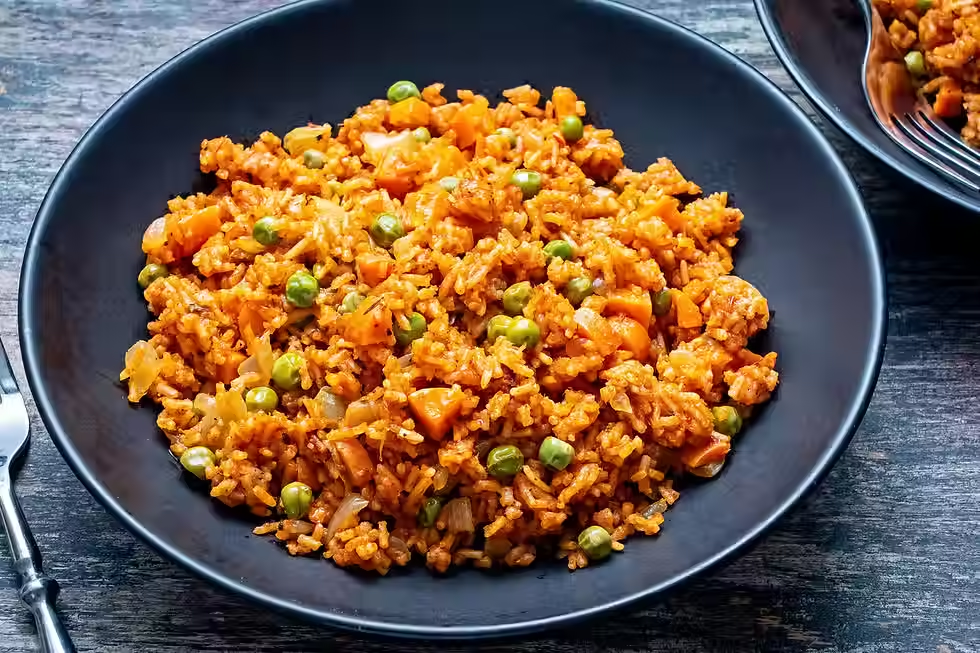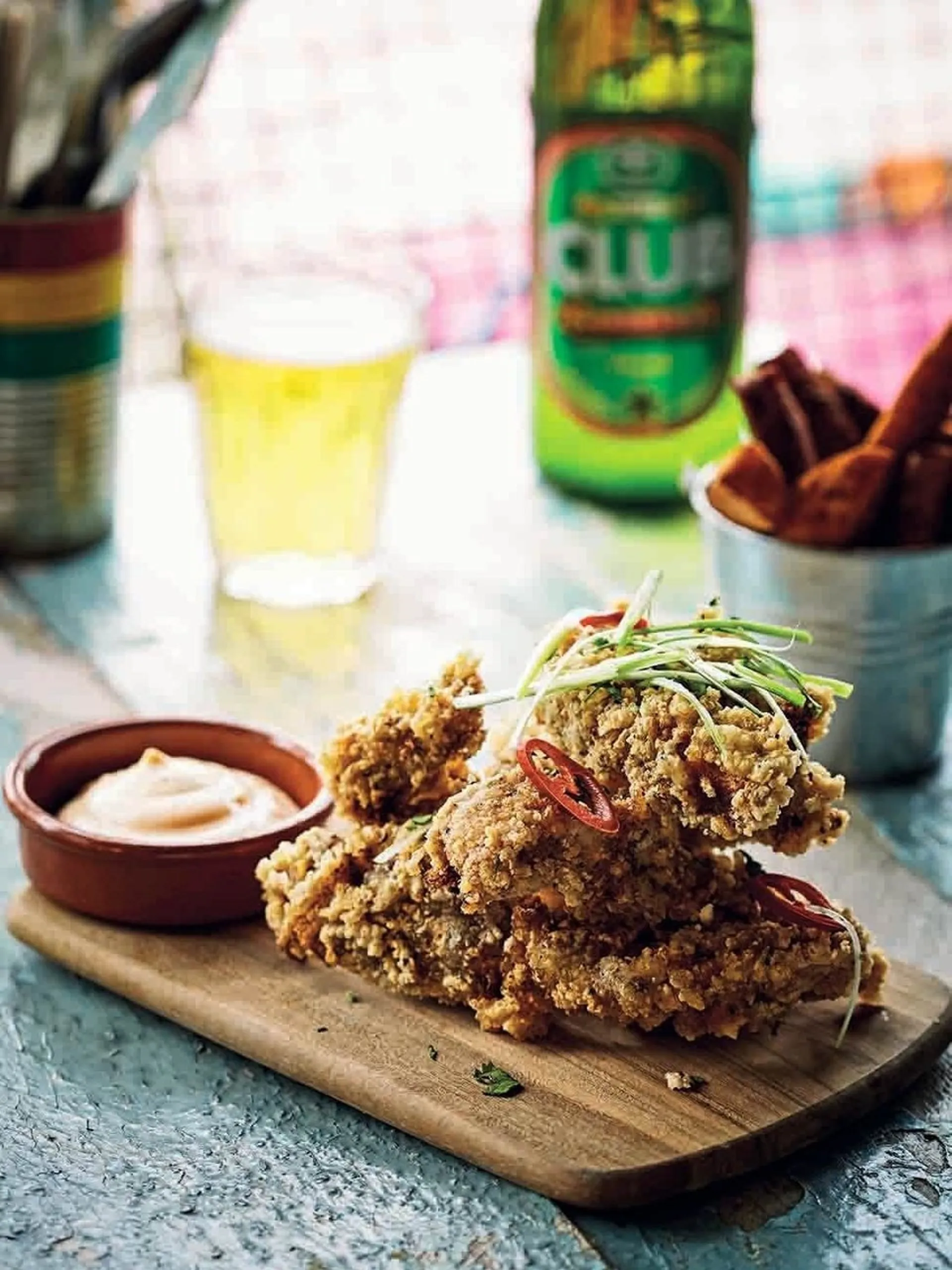Jollof rice - a quickie
- rosemary
- Apr 30, 2025
- 6 min read
“at home and in the diaspora, we will take up arms to defend anything and everything about it – its origin, preparation and by God, how it is served.” Ozoz Sokoh/The Kitchen Butterfly

Somehow or other the day has disappeared, and so a quickie. One of my New York Times recipes from my desk calendar - Jollof rice by Yewande Komolafe/New York Times. It appeared back in March, and I set it aside because the name rang a vague bell, although I didn't really know what it was, and it looked gorgeous.
There are not that many African immigrants in Australia as yet although the number is rising, and most of them come from East Africa, not West Africa, from which this rice dish emanates. I suspect that the British are quite au fait with jollof rice - you might be able to buy it readymade from Waitrose or Tesco for all I know. We however, are less familiar.
Really, I guess there is not much to tell which is why it suits my short time-frame today. So first of all a tiny bit of history. It's said to have begun in Senegal, at the time of the Jolof or Wolof Empire - for which I found two different dates - 12th century and 15th-18th centuries, and which spread over large parts of West Africa. In Senegal this rice dish is called thieboudienne and has been recognised as a UNESCO intangible cultural heritage. From Senegal it spread to other West African countries:
"Today, every country in West Africa has a version of jollof, each reflecting its particular history and influences." Ozoz Sokoh/Serious Eats

Or, as Zoe Adjonyoh, whose version of Jollof rice is shown here says:
“it’s a red sauce with onion and heat”. It’s what you do after this – the vegetables (carrots and peas are popular), rice, liquid, meat and the cooking method – that’s the subject of dispute in Ghana, Nigeria, Senegal, Sierra Leone, Liberia, Cameroon and beyond. “Every household has a different way of cooking it,” Zoe Adjonyoh
Maybe it's because, in the scheme of things its a relatively new dish to the western world, that African people get very hot under the collar about not making it correctly. The Italians have had a long time to adjust to what the rest of the world has done to their sacred pasta and pizza dishes, and now join in with gusto to all the various twists and convolutions that have since arisen. The Africans are relatively new to this and hence perhaps, protective. It's a matter of national pride.

Some time back Jamie Oliver published a version of jollof rice, which eventually, when it became noticed caused all manner of outrage in Britain - mostly because of the almost criminal, in their eyes, use of whole on the vine cherry tomatoes, lemon, and parsley. The recipe is no longer on his website. but the DVees website has published his version of Jollof rice and says this of it:
"In essence there are two ingredients that are real imposters: parsley and lemon. The proportions of tomato, onions and garlic are atypical and the rice is not cooked in a tomato pepper base however it is an excellent twist to Jollof rice. It does not taste like typical Jollof, but it is what it is, a twist to West African jollof: a delightful version that tastes like fresh Garlic & Herb Tomato Rice & Chicken. West African food is rich, captivating, bursting with spice and flavor and alien to the rest of the world, Jamie’s recipe has triggered conversation…. so let's live and let live." DVees
You would think that it's a good thing that the previously unknown cuisine of one country is being introduced to another - indeed from a colonised country to the coloniser's - but quite apart from the outrage at not cooking the dish the right way I found this additional negative opinion about Jamie's version:
"The danger is that in five years his version will become the official one." The blogger behind Motley Musing agrees: "We have to ask ourselves who actually benefits from Jamie Oliver's 'appreciation' of Jollof rice. This doesn't necessarily translate into value for Africans. For so long, different African cultures have been appropriated without any direct benefit to Africans themselves, and people are particularly sensitive to this." Vera Kwakofi/BBC Africa
I wonder if that is true. Of no benefit? Surely if people begin to appreciate the food of a country, what generally follows albeit slowly sometimes, is appreciation of the country and its people itself. not to mention its food. They look out for restaurants, ingredients, recipes, and who knows, may even be tempted to visit the source country.
When it comes to food we naturally adapt to suit our own tastes. Take chilli for example. There are many cuisines which have chilli hot dishes, that may not appeal to some more conservative western tastes. And so the amount of chilli in the dish is adjusted to suit. The result, is, of course, not what the original dish was, but it might nevertheless make somebody more interested in the food of that country - in the country and its people themselves.
Another benefit might be that more restaurants and foodstuffs from that country begin to appear, and these - at least the first ones - are almost always created by the people from those countries. You have only to look at the increasing number of Ethiopian eateries there are here. When I first came to Melbourne back in 1969 there were just two or three Indian restaurants - and they were not that authentic. Now there are many, many more and increasingly they are moving away from standart Indian restaurant fare to more distinct regional dishes.

At heart jollof rice is:
"rice that's stewed and seasoned to perfection, with an orange-red color and separate grains that are neither hard nor mush" Ozoz Sokoh/Serious Eats
This is his/her version of Nigerian jollof rice
which may well be different to Ghanaian, or Senegalese or LIberian jollof rice.
The very first website that popped up with a recipe was called Zena's Kitchen - the work of a young British Nigerian, who called her recipe Jollof rice (My mum's version) and here are Zena and her mum and here also is the finished dish.
It is homely, yet very precise, and with, I suspect, a non-traditional insistence on basmati rice and DeRica tomato purée. She was very definite about the tomato purée. Now for all I know she gets a kickback from DeRica, but it is apparently a double reduced tomato purée. Anyway it's a recipe from a genuine Nigerian. And this is her Ingredient breakdown, which gives you some idea of the taste. It actually sounds like lots of ingredients, as I have seen in the recipes I have found and a semi-complicated method, so possibly one to try when you have time on your hands.
Red bell pepper: Adds a touch of sweetness to balance the spice.
Vine tomatoes: Fresh, juicy tomatoes are essential for the sauce’s base.
Red onion: A milder, slightly sweet onion, perfect for building flavour.
Red scotch bonnet chillies: These pack heat—adjust to your spice level preference.
Garlic: Adds depth and an aromatic punch.
Fresh ginger: Sharp, zesty, and essential for a fragrant sauce.
Vegetable oil: Used to sauté the onions and purée.
Double concentrated tomato purée (DeRica): The star of the sauce, giving it a rich, tangy base.
Curry powder: Adds warmth and complexity.
Dried thyme: Earthy and herbal, balancing the tomato and spice.
Chicken stock cubes: Enhances the depth of flavour in the sauce.
Dried bay leaves: Infuse the dish with subtle, savoury aromas.
White basmati rice: A lighter, fluffier rice, perfect for absorbing the rich sauce.
Then - because - of course - people do meddle, one non-African and two Africans, with the most, if you like, outrageous being Jollof spaghetti (which may well have outraged the Italians too) - from The Flygerians (Jess and Jo Edun)/The Guardian - Africans whose mum makes them spaghetti with the same flavours as the rice. Then Marcus Samuelsson who doesn't sound very African has Chicken jollof rice on the Guardian website. And it doesn't look very red either. And last of all Zoe Adjonyoh - who seeems to be one of the African gurus - here on the Jamie Oliver website has Jollof fried chicken which looks utterly scrumptious and no rice in sight!
YEARS GONE BY
April 29
2023 - Carrot soup
2022 - Carrot cake - now there's a coincidence
2021 - Before I forget
2020 - Deleted
2019 - Nothing












It is so easy to become "precious" or is it even "woke" over origins and it appaers that is equally true of food, especially if it comes from countires who are anxious to preserve their culture. Africa's turn. Just as well India embraced its modern cultural origins and we can all enjoy the wonders of Indian food